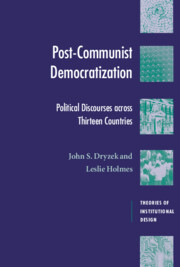Preface
Published online by Cambridge University Press: 22 September 2009
Summary
If we want to know what democracy means in practice, then we must look at what people make of it, in new, old, and proto-democracies alike. This study maps the way democracy and democratization are thought about and lived by people in the post-communist world – including the people for whom the idea of democracy has negative associations. We seek not just to understand how democratic politics is or is not conceptualized and practiced in these countries, but also to generate insights into the prospects for democratic development and institutional change. Thus we relate an account of the discursive field of democracy in each society to its histories and contexts (up to and including late 2000, when the final version of the typescript was completed), and explore the implications for what is probable and possible when it comes to trajectories of political reform. Political development and discourses of democracy (and authoritarianism) interact: discourses help determine what is possible and likely in political development, which in turn can change the terms of discourse.
In these pages we develop and test no general theory of democratization – such a theory is probably as elusive as Macintyre's (1973) general theory of holes. We are interested in explanation, and are happy both to deploy and to develop theory in its service. But we are also interested in interpretation and reconstruction.
- Type
- Chapter
- Information
- Post-Communist DemocratizationPolitical Discourses Across Thirteen Countries, pp. ix - xiPublisher: Cambridge University PressPrint publication year: 2002
- 1
- Cited by

